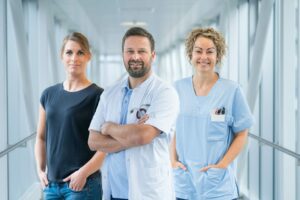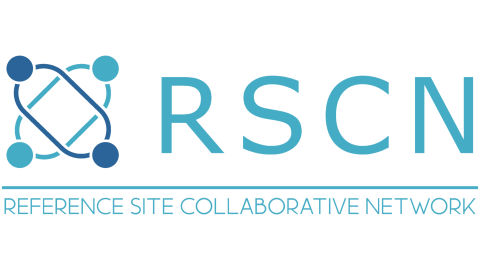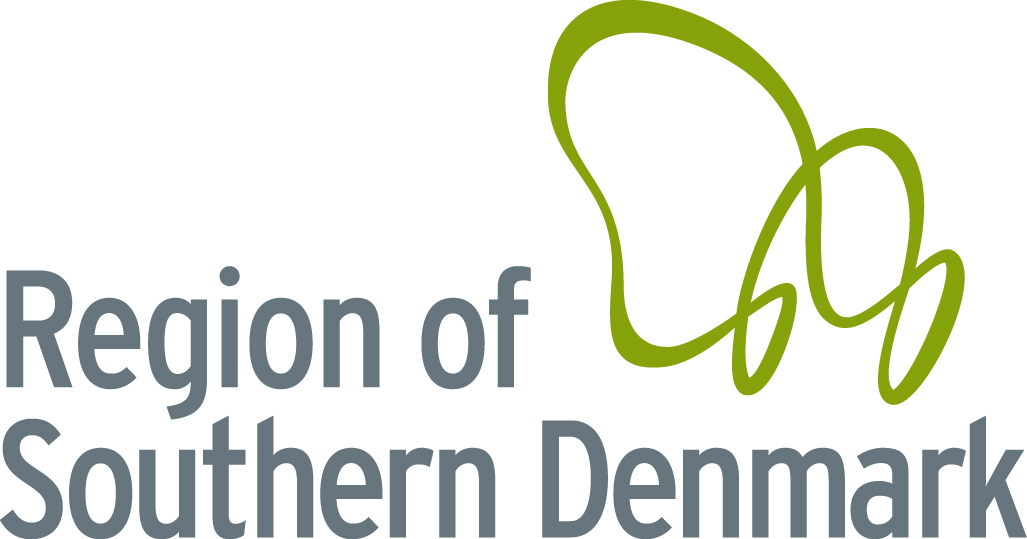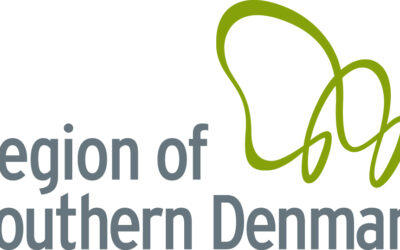Denmark is an international front-runner when it comes to digital health. On the vast majority of parameters, Denmark ranks as number one when it comes to e.g. IT systems in hospitals and general practice as well as digital communication between healthcare sectors. Many Danish digital solutions have been developed and implemented, both nationally and internationally, such as the Shared Medication Record and the national e-health portal called sundhed.dk.
The five administrative regions governed by democratically elected councils are responsible for the planning and delivery of specialized services as well as specialized social care and coordination. The regions own, manage, and fund hospitals and the majority of services delivered by private general practitioners (GPs), office-based specialists, physiotherapists, dentists, and pharmacists.
Facts about the Region of Southern Denmark:
- The total population is 1.2 million citizens
- Annual budget: €3.5 bio.
- 12,191 km2
- 5 main hospital units
- 22 municipalities
- 800 general practitioners
- Approx. 27,000 employees
The Regional Innovation Group is an advisory board for the Executive Board/Board of Managers, which supports the coordination and quality assurance for the collective innovation efforts in the Region of Southern Denmark. The group works with e.g. scaling solutions between units, knowledge exchange, implementation models as well as the linkage between innovation and the South Denmark Improvement Model. The group includes innovation managers from all hospitals, social care, Regional IT, Regional Development and the Health Innovation Centre.
The innovation field is generally organised decentrally in the Region of Southern Denmark. The hospitals are thus responsible for organising the efforts and framework deemed appropriate in relation to local needs.
In addition, the Health Innovation Centre of Southern Denmark, which is the innovation central unit in the region, make innovation competencies available for the hospitals, social care etc. At the same time there is a close cooperation between central regional units such as Regional IT, the department for Cross-sectorial Collaboration, Regional Development and department for documentation and management information, HR and more.
Danish Regions have appointed an Innovation Board, which works with the dissemination of solutions from the 5 regions and thus adds to the Regional Innovation Group as a cross-regional extension. To support the decentral approach to innovation and improvement in the Region of Southern Denmark, structures have thus been put in place to support cooperation and knowledge exchange.
The purpose of the Innovation Strategy is to coordinate the direction of the joint (decentral) innovation efforts in the region, in which innovation is utilised as the mainspring of improving health and care services for the citizens of the region. One of the main aims is to share and employ knowledge from other regions, nationally and internationally, as well as collaboration with industry and research partners.
The Strategy outlines 5 agreed main thematic areas:
- integrated care
- data and digitalisation as the foundation for innovation
- Medicine
- patient-experienced value and quality
- efficient healthcare services.
Health innovation is one of six tracks in the strategy, under the name of Healthy Life Years. It covers 3 regional goals:
- Improve the mental and physical well-being of our citizens
- Strengthen healthy living conditions through knowledge about local socio-economic differences
- Advance new solutions through public-private innovation
Health innovation and public-private innovation is thus still a central goal of the regional development strategy, which will be supported by holistic initiatives across the healthcare and regional development focus areas.
The Region of Southern Denmark is a hub for a wide array of actors within health innovation, across research and education (such as SDU, SLB etc.), clusters (Welfare Tech), Health and social care (4 hospital units and social care), knowledge institutions and more. Many of them in this very area around the Science Park. We have been working together across sectors for a long time and have a flourishing ecosystem within the health innovation field, which includes many small and large joint project, with national and international perspectives.
The strong regional ecosystem has, among other things, led to an international acknowledgement by the EU through the European Innovation Partnership for Active and Healthy Ageing, with four stars work in driving regional innovation in active and healthy ageing, improving the quality of life of the ageing population, making health and social care delivery more sustainable and stimulating economic growth and competitiveness. Our status as a reference site spands a highly competent network of municipalities, hospitals, companies, research institutions and civil society in joint efforts to develop better solutions for the older citizens in our region. We call it the South DENMARK eHealth ECOsystem. This work is partly unfolded in the EIP on AHA, and partly through the ECHAlliance (European Connected Health Alliance), which is a network of regional ecosystems and companies working to share knowledge and experiences and partner up in projects.
The international collaboration is, among other things, about our region contributing to making our knowledge and competencies available for others, while gaining new knowledge and inspiration from other countries, as well as establishing strong relations with potential partners and networks for collaboration, e.g. through active participation in relevant networks.

Projets
ProVaHealth is a collaboration across 8 different countries in the Baltic Sea Region, with 17 primary partners, of which 14 represent a Living Lab.
The Erasmus+ innovation projects DELIVER, DISH et EUVECA, as well as the HealthTech Innovator and InnoEvent contribute to the upskilling and empowerment of the health care workforce. The Eramus + project HEAL looks into new forms of practice education for health care students and the EDEN project deals with the empowerment of elderly citizens living with dementia and their relatives.
The University of Southern Denmark led the INTERREG 5a WIPP project which developed innovative strategies for primary prevention for older citizens. The WIPP concept is now implemented in several municipalities.
The Region led the H2020 project, ImpleMentAll, focusing on effective implementation of eHealth interventions across Europe. The project results and the ItFits Toolkit is now used in several projects across Europe to drive implementation processes. Similarly, the MAST model was developed in the EU project MethoTelemed.
The Region was a partner in the H2020 CSA project EURIPHI where 25 partners in Europe collaborated to introduce innovation and integrated care solutions in Europe’s health and social care systems through cross-border value-based innovation procurement.
The Region led the ERASMUS+ project, DISH – Digital & Innovation Skills Helix in Health, which investigated the needs for skills to successfully implement digital solutions within healthcare. Another ERASMUS+ project, EDEN Embracing DEmeNtia, focused on embracing dementia as a community challenge and community-based care.
Health-CAT was funded by Interreg and Syddansk Vækstforum and ran from 2017 to 2020. Health-CAT aimed at addressing societal challenges, e.g. induced by the demographic change, by identifying where exactly robot can be introduced for which use cases and developing a prototype as well as a commercialization strategy for a robotic solution.
The Region has participated in Interreg collaborations such as ACCESS & ACCELERATION focusing on overcoming barriers in development of innovative health technology, and ProVaHealth – Proof and Validation in Health, which stimulated cooperation among health laboratories in the Baltic Sea region and tested new technologies in real-life contexts.
The Region actively participates and shares knowledge in the PEI sur l'AHA and through European networks such as RSCN, CORAL, ERRIN, ECHAlliance, EHTEL, NoRS (the Network of Nordic Reference Sites), and NOS HS (Nordic Public Private Innovation and Research Network).
European Union funded MasterMind, which stands for: MAnagement of mental health diSorders Through advancEd technology and seRvices – telehealth for the MIND. The project’s focus was telemedicine within the psychiatry – more specifically telemedicine for treatment of depression. Depression is a disease with high incidence and social costs in Europe, but also an area with proven clinical effectiveness of ICT (information and communication technology) in its treatment. The aim was to offer a patient-centred treatment course and ensure that the patient has access to high-quality treatment in their immediate environment. The MasterMind project implemented cognitive behavioral therapy through digital services for almost 5,000 depressive adults in eleven European countries and implemented collaborative care through video conference for patients with depression, who were treated by general practitioners. Videoconferences were used to create networks between the health professionals in order to make it easier for them to support each other and to share knowledge. In addition, video conferences could be used for offering specialist treatment in remote areas. In that way, patients with depression gained access to therapy if they had internet access. After the end of the project, the telepsychiatric solutions are still in use by most of the partners, and many have decided to upscale their service for more diseases and users. In Denmark, internet psychiatry is still an option for patients with panic disorder, social phobia, other phobias and light to moderate depression. The solution is now national, and it is managed by the Telepsychiatric Centre in the Region of Southern Denmark.
The project, JadeCare, is a Joint Action supported by the European Commission to scale out 4 strong integrated care solutions, of which the South Denmark approach is one example. Our role is to help 8 European regions learn more about the South Denmark approach to digitally enabled and patient centred integrated care and communication across discplines. We will support the regions in using our experiences and adapting and implementing our approach in their healthcare sectors.
Currently, 2022, the Region actively participates in several European projects:
- JADECARE
- DELIVER
- PRAGMATIC
- ADLIFE
- EUVECA
- HEAL
- SenAte
- eCAN
- MMT
More projects are on the way…
Domaines de bonnes pratiques
The Region of Southern Denmark has a wide array of projects and good practices and are very keen to share knowledge and experiences. Below a small sample of some of the areas of good practice in the Region:
SAM:BO, is the agreement that merges the Health Agreement and the electronic standards in the Region. In here a description of which messages are to be sent at which point of the care pathways guides the sectors in setting up the correct communication procedures.
Tele-psychiatry
In 2013 we opened the Telepsychiatric center in the Region with the ambition to develop and evaluate digital communication and devices for patients with a psychiatric diagnosis.
My Patient Journey
“My Patient Journey” is an app developed at Odense University Hospital to facilitate digital communication between the hospital departments and patients. The app also helps patients find and keep track of information from the hospital and gives them a better overview and experience in communicating with the hospital.
Online physical rehabilitation
Another similar app is the online physical rehabilitation platform that allows rehabilitation therapists in the hospital or municipality to design a training program from a range of exercises to fit the patient. The exercises are short videos of trained therapists showing how to do the exercise and the patients can access these videos on their mobile devices and register their pain level when they have finished.
Digital Health Center
The vision of the Digital Health Centre project is to develop and integrate digital solutions in the courses of the healthcare centres. Under this vision, several subprojects are unfolded. Patients can join from home, where the can see pre-recorded information, participate in webinars gain knowledge by reading short texts, and chat with both health care professionals and other patients.
Geri Toolbox
With the aim of reducing acute admissions, the GERI Toolbox contributes to early detection and timely intervention for elderly citizens with multi-morbidities and loss of functional capabilities.
Home care nurses use in-home clinical equipment (incl. a mini laboratory) and telemedicine technology. This allows GPs to receive basic objective health information that supports early clinical decision-making and timely intervention.
Tele-COPD
The national initiative is focused on patient education, early detection of symptoms and an increase in quality of life. In the project 22 municipalities, 4 hospitals and a large number of GP’s are included in the Region of Southern Denmark. The patients are offered devices to measure oxygen levels, pulse and weight at home. The collection and distribution of the information is in line with the national joint procurement of telemedicine.
Tele-psychiatry
In 2013 we opened the Center for Digital Psychiatry in the Region with the ambition to develop and evaluate digital communication and devices for patients with a psychiatric diagnosis. One of the projects was the European Union funded MasterMind. The project’s focus was telemedicine within the psychiatry – more specifically telemedicine for treatment of depression.
Rapid Rollout of Telemedicine during COVID-19
Before the pandemic, the Region of Southern Denmark was gradually rolling out secure video consultation solution for the 800 General Practitioners in the Region. This roll-out has been expedited in the context of Covid-19 to ensure that citizens can have consultations with their doctors from the safety of their own home.
Video-consulted patient rounds
Patient rounds are held in a virtual secure/encrypted meeting room between health care professionals, the patient at the hospital and their relatives, who can participate regardless of their physical location. The patient rounds are done at a fixed time and through a link, where the relatives can log-on by using their phone, tablet or computer. This area is one of three regional projects to be scaled up in the Region of Southern Denmark in the coming years.
évènements à venir
Region of Southern Denmark Events
Find out more about past, current and futur events in Southern Denmark Region.
Site Web et autres liens de médias sociaux vers le site de référence AHA
LinkedIn: Syddansk Sundhedsinnovation
Twitter: @SdsiOfficial
Web: www.innsouth.dk
Contact: Emilie.Brysting@rsyd.dk


